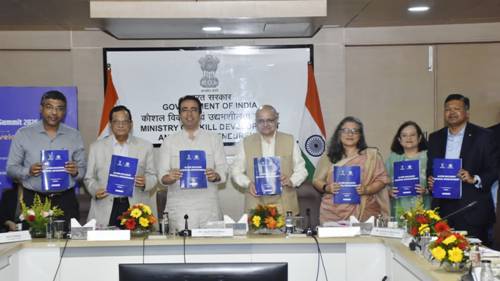
NITI Aayog has unveiled a pioneering study that provides a crucial roadmap for applying AI for India’s informal workers. The comprehensive report, titled “AI for Inclusive Societal Development,” was developed in close partnership with Deloitte. It focuses squarely on uplifting the nation’s massive population of 490 million informal workers. These workers form the backbone of the economy, contributing nearly half of India’s GDP, yet often remain outside formal systems of protection and productivity.
The launch ceremony was conducted on October 8, 2025. It was led by Jayant Chaudhary, Minister of State (Independent Charge) for Skill Development & Entrepreneurship, and Shri Suman Bery, Vice Chairperson of NITI Aayog. This focus immediately shifts the traditional global AI discourse, which typically centres on white-collar jobs and the formal economy, directly to the marginalized informal sector. The report aligns the future of AI with the national vision of achieving Viksit Bharat (Developed India) by 2047.
Mission Digital ShramSetu: Making AI Accessible for India’s Workforce
The NITI Aayog Frontier Tech Hub study does more than just analyze the sector; it proposes a concrete plan of action. To bridge the widening gap between technology and the marginalised, NITI Aayog has proposed Mission Digital ShramSetu. This new national mission aims to build the critical roadmap and the necessary ecosystem to make AI accessible, affordable, and impactful for every informal worker.

The mission will utilize frontier technologies—including Artificial Intelligence (AI), blockchain, and immersive learning—to tackle major systemic constraints. These constraints primarily include limited market access, financial insecurity, and the lack of proper skilling or social protection. Shri Jayant Chaudhary emphasized that empowering these 490 million workers is not merely an economic priority but fundamentally a “moral imperative.” The goal of Digital Skilling in AI aligns perfectly with the national skilling agenda. It promises to make learning adaptive, accessible, and demand-driven for everyone from farmers and artisans to healthcare aides, ensuring they thrive in the digital economy of tomorrow.
Urgency of Skilling and Collaboration for Inclusive AI
The report stressed a crucial finding: AI alone cannot transform the informal sector. Technology by itself cannot dismantle deep-rooted, systemic barriers to inclusion. Without deliberate human intent, targeted investments, and an enabling ecosystem, the promise of AI will remain out of reach for those who need it most. Collaboration is therefore deemed non-negotiable for the success of AI for Informal Workers.

CEO of NITI Aayog, B V R Subrahmanyam, reinforced that serious transformation requires cross-functional action. This involves focused R&D to reduce the cost of frontier technologies and building a sustainable ecosystem of innovation tailored for the informal sector, alongside robust, large-scale skilling and reskilling initiatives. The roadmap issued a severe warning, underscoring that delays are costly. If the current pace continues, the average annual income of informal workers may stagnate around $6,000 by 2047. This is significantly below the $14,500 threshold required for India to achieve high-income status. This makes immediate, coordinated action on AI for Informal Workers \essential for the Viksit Bharat goal.

